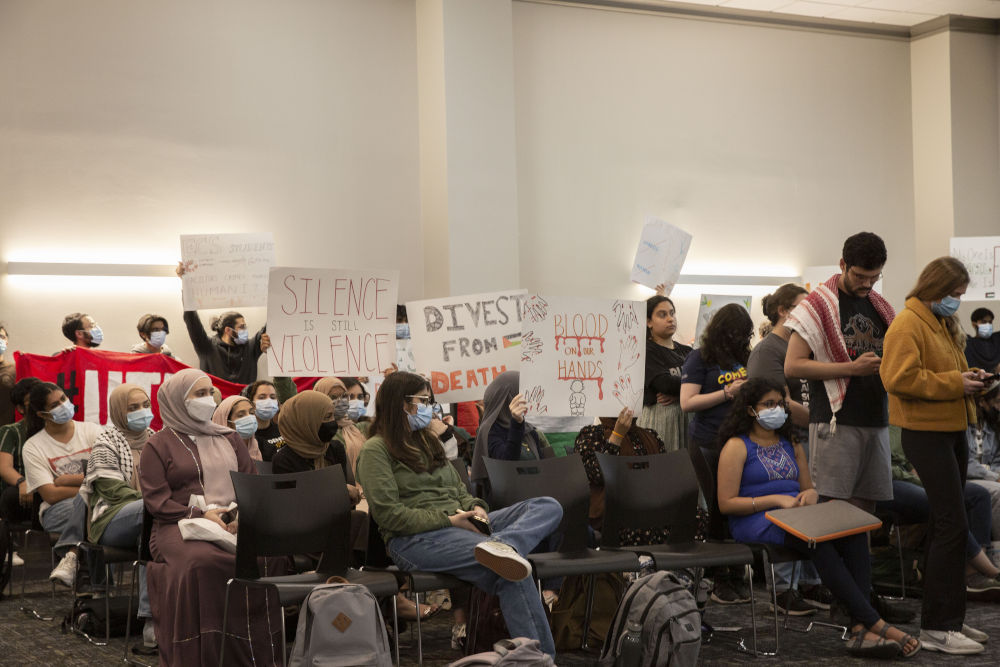Student Government passed a resolution calling on UTD to divest funds from five weapon-manufacturing companies on April 4 as a push against militarism and for corporate responsibility.
S.R. 2022-40, or “Divestment for Militarism,” recommends that UTD divest its shares in the University of Texas Investment Management Company, or UTIMCO, which manages UTD’s investments and endowment funds. The five companies of interest are Raytheon Technologies, Lockheed Martin, Boeing, Northrop Grumman and General Dynamics, which provide arms for various countries, including the U.S., Saudi Arabia and Israel.
According to reports from UTIMCO’s Permanent University Fund Schedule of Investment, UTIMCO invests over $10.5 million in companies whose contributions have been used to fund violence against civilians in countries such as the U.S., Mexico, Palestine and Yemen. The resolution calls on UTD to guarantee transparency in future investments and develop a Socially Responsible Investment framework to set a plan for ethical investing. Copies of S.R. 2022-40 are en route to the Texas Board of Regents and the president of UTD. The resolution was authored by Nidaa Lafi, a global business and IMP senator, and neuroscience senator Khaled Shihabi, who are also a part of the advocacy group Students for Justice in Palestine.
“We view this resolution as step one in a much longer fight to have our university fully divest from the militarism industry more largely,” Lafi said. “The goal is to get it to the UTIMCO level.”
Lafi said the resolution started as an initiative from SJP and has since received co-sponsorship from 19 student organizations, including Deeds Not Words — the largest political organization on campus — the League of Latin American Students, Pride @ UTD, several Greek life groups and the Muslim Student Association, to name a few. A student petition in support of the resolution has gathered over 800 signatures.
“Historically, divestment has been a very powerful tool for political change,” Lafi said. “We think of apartheid in South Africa, and how student organizers across the country in the ’80s called on their campus to divest from corporations complicit in or directly facilitating apartheid or engaging in business with them … The reason we targeted these corporations are because of their direct relationship with facilitating war, death, apartheid and genocide around the world.”
SJP presented a similar but less structured proposal at an SG senate meeting last spring, but it did not make the agenda. In response, Lafi and Shihabi created the Divestment Committee, a union of students and organizations committed to strengthening divestment initiatives.
“This campaign was much better than last year’s,” Isabella Spartz, SG senator, resolution co-sponsor and finance and economics junior, said. “We had a couple of people from [the Divestment Committee] help, but not write the resolution itself. It was much more clear and in detail compared to last year’s, and we had a lot more people have eyes over it.”
Similar initiatives have been pursued and passed through student governments across the U.S., including at the University of Ohio, Columbia University and the University of Houston. Alex Kerry, the UH student who organized his campuses’ Divest from Death campaign, was one of nearly a hundred students that showed up to the April 4 senate meeting.
“I want to point out two things,” Kerry said. “UH Divest built a tangible front for collective liberation. As Palestinian, Black, Latinx, Jewish, Asian and more students committed to building a better world, UH brought us together in a solidarity that transcends race, class and place and affirms that our freedoms are intertwined. Second, Divest created a safe space for marginalized communities on campus … UT Dallas and its organizations have put a strong and powerful campaign, which has brought together organizations representing thousands of students.”
Comets had an opportunity to speak either in favor of or against the resolution before SG voted on it. The majority of students in attendance echoed statements of support with Kerry or told stories of escaping military violence.
Near the end of the speaking segment, a few community members brought up concerns about how the divestment initiative could affect students that support Israel or identify as Jewish.
“It’s important that every single student is protected from Palestinian students to Jewish students,” a Richardson resident said. “I encourage you to take a moment to think about how Jewish students will be impacted, and how they’ll be ostracized.”
In response, SG made one amendment to the resolution in closed session to further solidify the aim of the resolution, which is “not a statement against any particular group of people, but a statement against militarism in all its forms.” The amendment further explained that SG condemns any action taken against any group of people in the name of this resolution.
“I would encourage students to read the resolution in full if they haven’t already, as it seems like any misconceptions can be cleared up by that alone,” Lafi said. “I want to make it clear that we are opposed to militarism. This is a resolution against war. And I think that’s something we can all get behind.”





